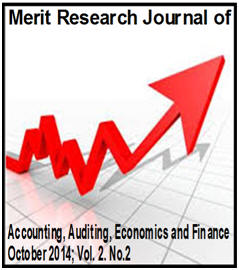
|
|
|
|
|
|
/ / MRJAAEF Home / / About MRJAAEF / / Submit Manuscripts / / Call For Articles / / Editorial Board / / Archive / / Author's Guide / /
|
Other viewing option
Other links:
|
Finance, development and growth in Nigeria: Obstacles, steps adopted and DOHA recommendation |
|||
|
Dr. Satope Bola Funmilayo |
||||
|
Faculty of Business and Social
Sciences, Adeleke University, Ede; Osun State, Nigeria Accepted October 06, 2014 |
||||
|
Abstract |
||||
|
The definitions
of both economic growth and economic development are related and
show that a nation cannot achieve economic development without
having achieved economic growth. A close relationship is said to
exist between the three variables: economic growth, economic
development and financial development (Kehinde and Adejuwon,
2011). There are many factors determining growth which were
divided into demand and supply sides in economics. Nigeria as
one of the developing countries in Africa, despite the fact that
the country is one of the richest and most populous countries in
the continent has relatively low life expectancy at 50 years,
and even negative relationships between economic growth and
growth variables from empirical studies. These are seen as
indication of low level of development in the country despite
its rich resources. This paper therefore used analytical
technique and descriptive statistics to examine some of the
reasons for low economic growth/development in Nigeria using
secondary data from World Bank, and Central Bank (CBN). A
deepening poverty; corruption, unemployment, poor
infrastructures, inadequate capacity for socio-economic
management; poor leadership, a low per capita income and others
were found existing as obstacles to growth. The steps already
taken by the country for development were identified as banking
reform, poverty alleviation programmes and others. However,
recommendations were made for better economic growth of the
economy based on the causes of low growth of the country like
corruption, fluctuating real GDP, poverty, poor governance and
others and the recommendations of DOHA International Conference
for development. |
Merit Research Journals© 2016 || Advertisement | Privacy policy.
